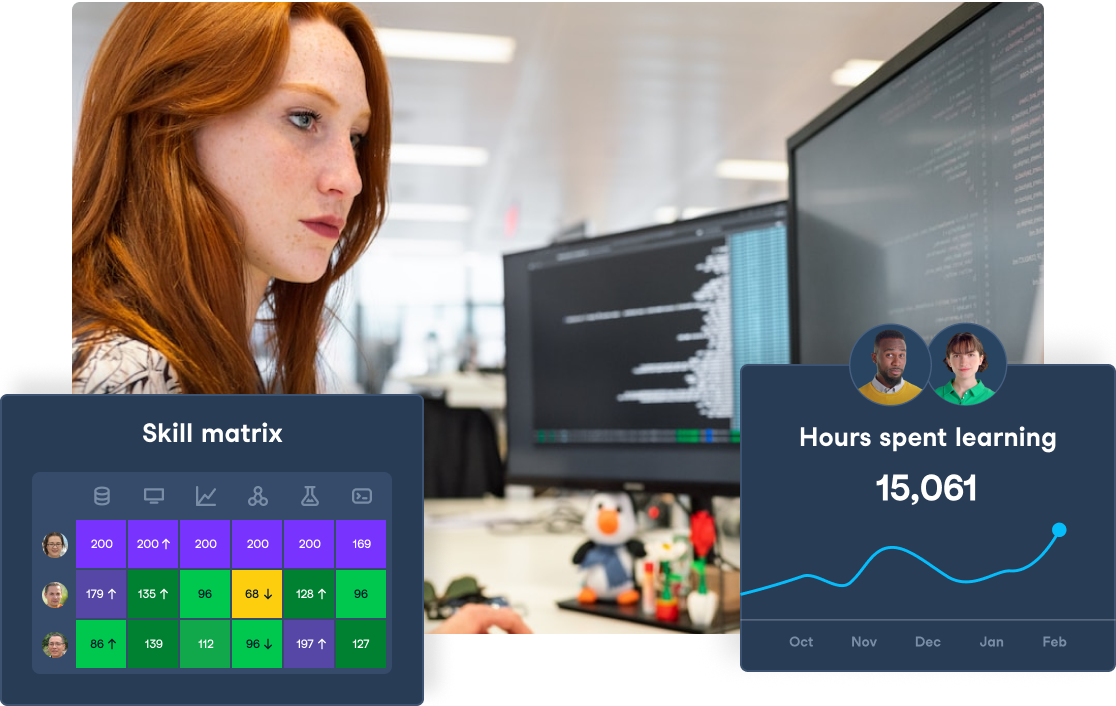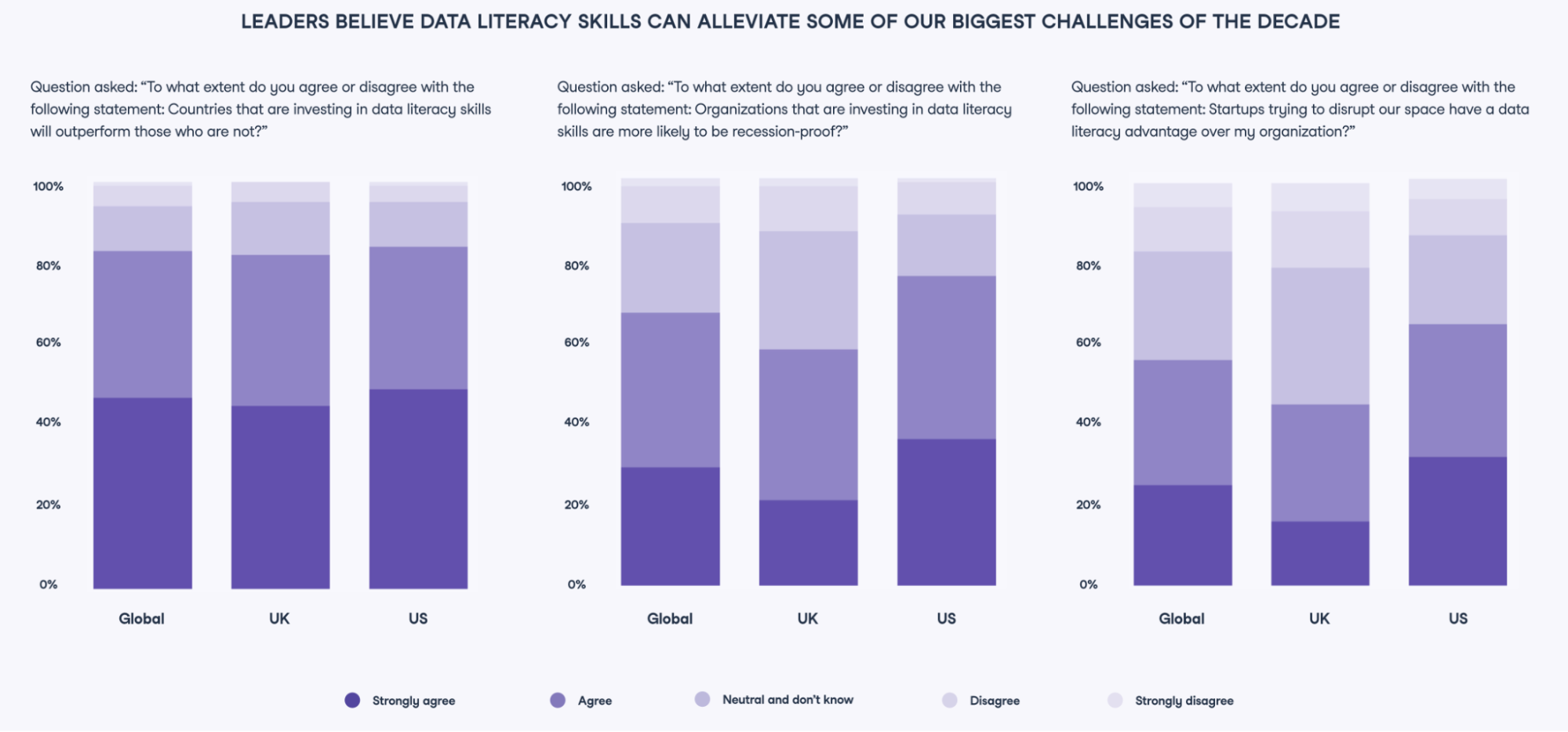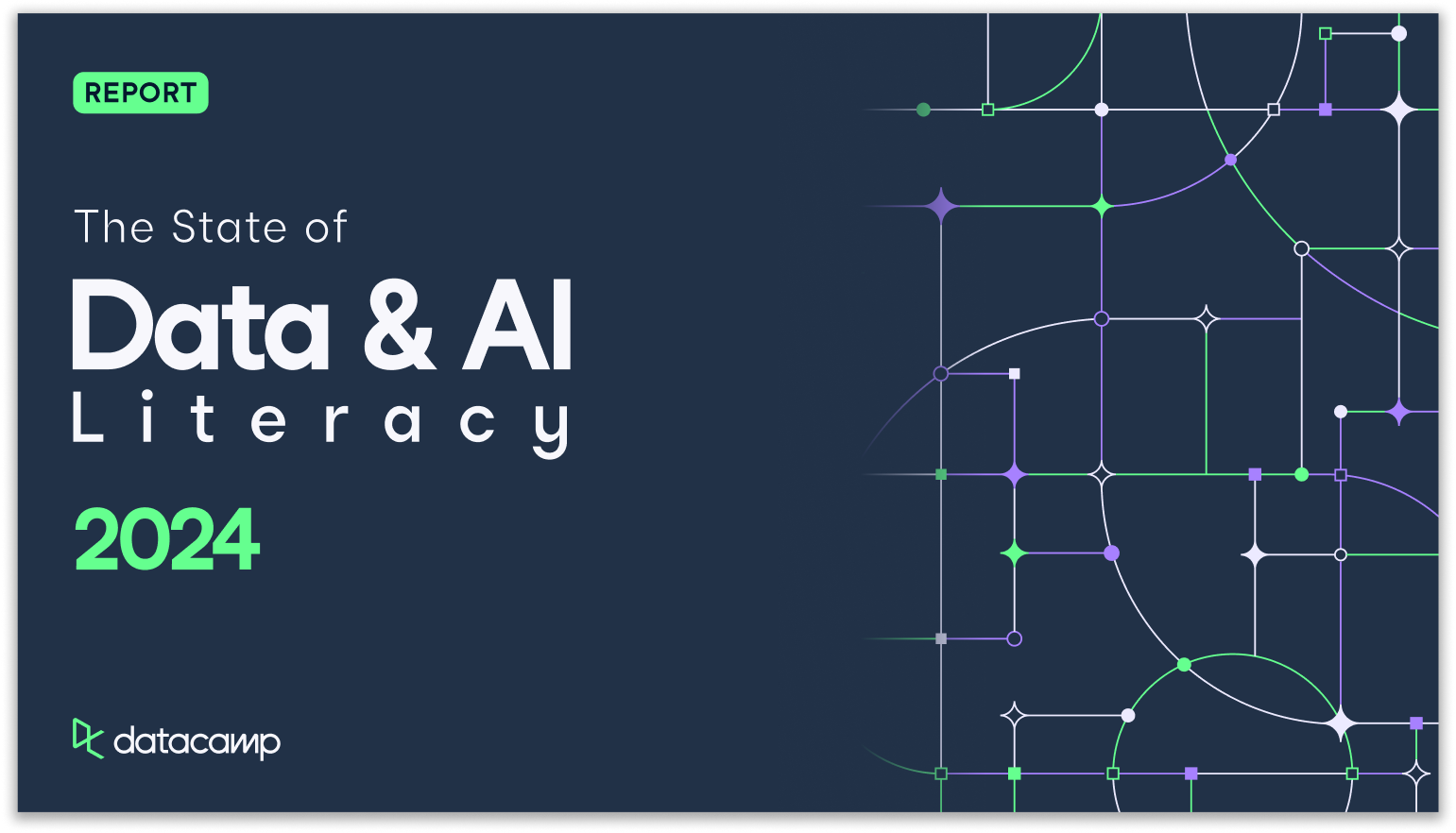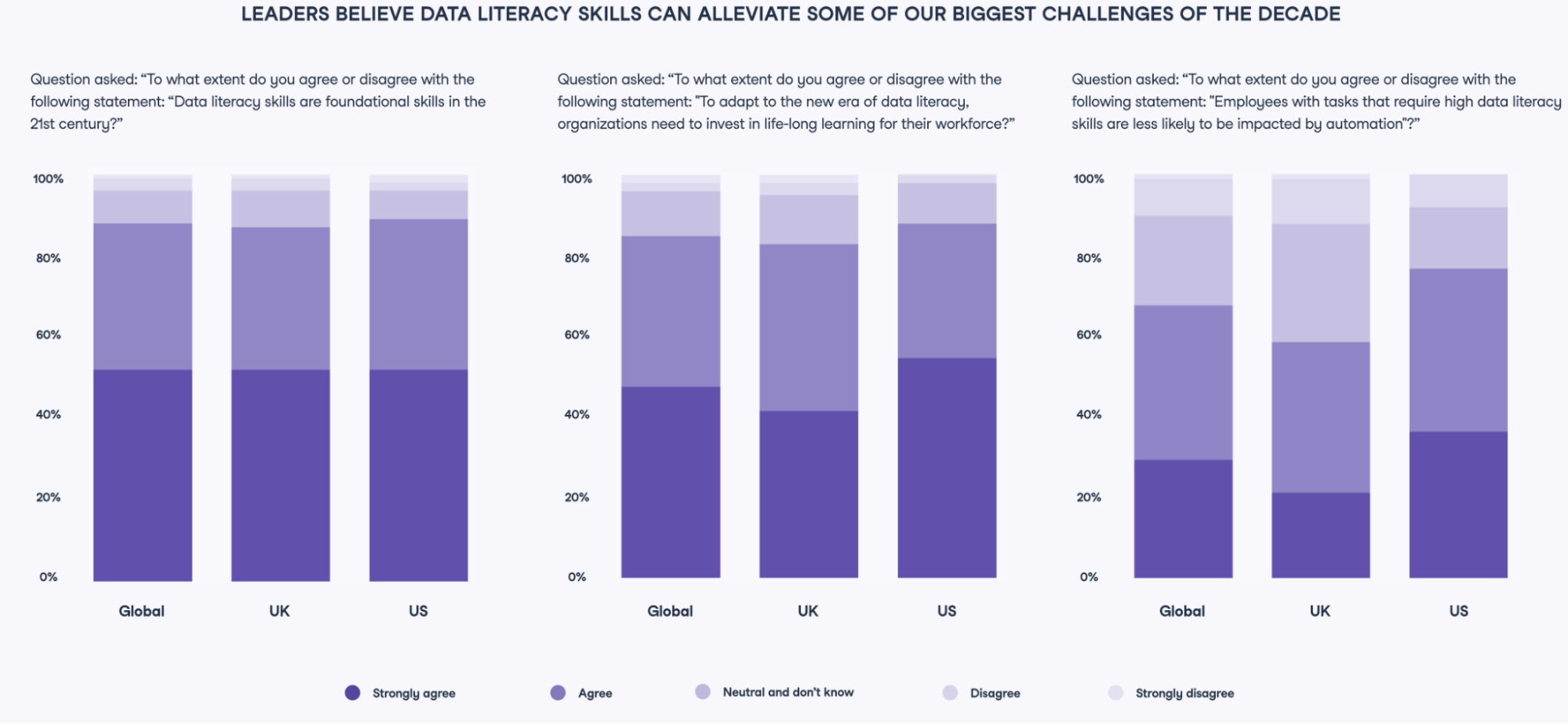With the rapid development of technology and the increasing importance of data in our daily lives, a fundamental shift is underway. As such, data literacy is becoming an essential skill for everyone - from students to professionals and beyond. According to DataCamp’s State of Data Literacy Report 2023, an overwhelming 90% of respondents agreed on the urgent need for schools and universities to incorporate data literacy courses into their curriculum, thus highlighting the necessity for systemic, grassroots-level changes.
But what does the future of data skills look like? And how will technologies such as generative AI impact the need for data and AI literacy? In this post, we explore some key themes emerging from our research and expert insights. If you're a business leader looking to implement a data literacy strategy, you should view our webinar, Getting ROI From Your Data Literacy Program.
Empower Your Team with Data Literacy
Enhance your team's data literacy and decision-making capabilities with DataCamp for Business. Access diverse courses, hands-on projects, and centralized insights for teams of 2 or more.

The Current Disconnect in Data Literacy Education
Despite the widespread recognition of the need for data literacy, our society has a sizable gap in translating this acknowledgment into practice. In a 2021 report by Forrester, it was found that while data literacy was the most in-demand skill for entry-level positions, a mere 48% of academic institutions had implemented data literacy skills initiatives.
The under-preparation of students in data literacy not only puts individuals at a disadvantage when seeking employment but also potentially hampers businesses that depend on data-literate employees to drive growth and innovation. The inability of educational institutions to equip students with these crucial skills can therefore lead to a significant skills gap in the market.
Interestingly, it seems that institutions that recognize and respond to the demand for data literacy are rewarded for their efforts. Schools and universities that have implemented data literacy initiatives see a direct payoff, with a higher job placement rate of 11.5% compared to those that don't promote these skills. This statistic underlines the correlation between data literacy education and improved career prospects for graduates.
In essence, this disconnect in data literacy education highlights a critical issue in our education system, where the skills being taught are not aligning with the demands of the modern job market. The need for a more systemic integration of data literacy into curriculums is evident, and this shift would benefit not only students and their future employers but society as a whole.

Findings from the State of Data Literacy Report showing the importance of data literacy
Download the State of Data & AI Literacy Report 2024
Uncover what 550+ leaders in the US & UK believe about the state of their teams’ data & AI skills.

Looking to the Future: Data Literacy as a Foundational Skill
A promising perspective from our survey is the recognition of data literacy as a foundational skill for the 21st century, with 88% of respondents endorsing this idea. Furthermore, over half (52%) strongly concurred, emphasizing the fundamental importance of data literacy in this era.
In this context, a "foundational skill" refers to universally beneficial abilities, regardless of one's job role or industry. Just like reading, writing, and arithmetic, data literacy is becoming an essential capability that everyone should possess to succeed in the 21st century.
With technology evolving at breakneck speeds, data literacy is not a skill that can be mastered once and for all. Instead, it requires continuous learning and adaptation as new data tools and techniques emerge. This is where the concept of lifelong learning comes in.
The State of Data Literacy Report found that a significant 85% of respondents agreed that organizations should invest in lifelong learning for their workforce, emphasizing the need for continuous upskilling and reskilling in data literacy.

Findings from the State of Data Literacy Report showing themes on the future of data literacy
The geographic perspective
Delving deeper, it's interesting to note that slightly more people agreed with the necessity for lifelong data learning in the US (87%) compared to the UK (82%). This geographical variance underlines the diverse attitudes toward data literacy and the need for a unified, global approach.
Addressing the Data Skills Gap: A Dual Responsibility
Despite the clear recognition of data literacy's importance, it's alarming that only 14% of leaders claim their employees outside of data roles receive data training. This discrepancy indicates that both modern organizations and educational institutions need to step up their efforts in closing the data skills gap.
When companies and institutions make a concerted effort to upskill their personnel in data, they reap significant benefits, as exemplified by the case studies of DataCamp for Business customers.
Training 2 or more people? Check out our Business solutions
Get your team access to the full DataCamp library, with centralized reporting, assignments, projects and more

Data Literacy and the Future of Work
Our survey further revealed that data literacy could be a buffer against the potential threats of automation. 63% of respondents believed that employees with tasks requiring high data literacy skills are less likely to be impacted by automation. This perception underscores the value of data skills in increasing resilience, adaptability, and competitiveness in the job market.
Addressing Global Challenges with Data Literacy
As the importance of data grows, so does the realization of its potential to address and even mitigate some of the most pressing challenges of our decade. A well-rounded understanding of data isn't merely a desirable skill set restricted to particular industries or roles - it's increasingly being seen as a key element of societal resilience and progress.
Building resilience through data upskilling
Data upskilling can have far-reaching impacts beyond the confines of individual organizations. Our survey revealed that a significant 67% of data and business leaders believe organizations investing in data upskilling are more likely to be recession-proof. This suggests that a strong foundation in data literacy can equip companies with the flexibility and resilience needed to navigate through economic downturns.
Furthermore, an overwhelming 85% of respondents felt that countries investing in data literacy skills will outperform those that do not. This insight underscores how the data skills economy can play a pivotal role in determining the future leaders on the global stage.
Data literacy as a defense against AI-Powered misinformation
In the broader societal context, data literacy can serve as a powerful tool in the fight against key challenges such as AI-powered misinformation. The rise of advanced AI tools like ChatGPT and DALLE-2, capable of generating human-like text and images, has presented a dual-edged sword. While the beneficial applications of these tools are numerous, they also carry the risk of being used to propagate misinformation.
This sentiment is echoed by Anjali Samani, Director of Data Science & Data Intelligence at Salesforce. Samani underlines the critical role of data literacy in the era of fake news, deepfakes, and post-truth politics. She advocates for everyone, including children, to become data literate, emphasizing the importance of asking critical questions about the data and the world around them.
In her words,
In the past, you could say seeing is believing. But with deepfakes and AI-powered misinformation, we can no longer say that. If you're not asking the right questions about the data and the technologies we see, you could be doing yourself and future generations a disservice.
Anjali Samani, Director of Data Science & Data Intelligence at Salesforce
Conclusion
As we navigate through an era increasingly reliant on data, embracing data literacy across all levels of society can equip us to deal more effectively with the challenges that lie ahead. By investing in data upskilling, we can create more resilient organizations, foster competitive economies, and arm ourselves against the growing threat of misinformation.
Data literacy is not just a nice-to-have skill but a necessity that holds the key to future societal progress. Ensuring access to data literacy education and continuous learning within the workforce is paramount, and it is a responsibility that rests on the shoulders of educational institutions, organizations, and governments alike.

A senior editor in the AI and edtech space. Committed to exploring data and AI trends.


